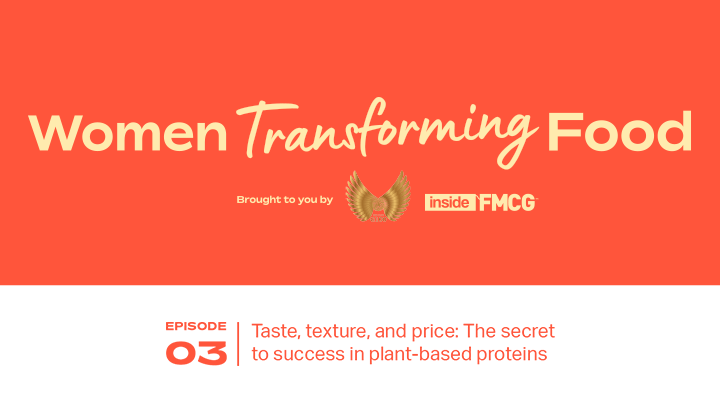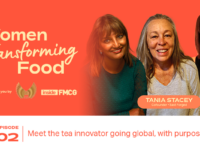A butcher’s daughter whose family has been in the meat trade for more than 30 years, Diem Fuggersberger entered the plant-based space by accident. During a course on selling meat, she was shocked to learn how much grain a cow eats. “I thought: we shouldn’t be feeding eight tonnes of grains to a cow every year when there is so much poverty in the world.”
What followed was an epic tale of research, trial and error, persistence, and patience that led to the formation of Coco & Lucas, a story she shares in the latest edition of the monthly podcast Women Transforming Food – brought to you by G100 and Inside FMCG – which explores the stories of inspiring women shaping the food industry today. Fuggersberger spoke with co-hosts Amie Larter, CEO of Inside FMCG’s publisher, Octomedia, and Angeline Achariya, Asia Pacific chair of G100’s food systems innovation and resilience wing.
As Fuggersberger takes up her story, when she returned from the course, she did not want to sell meat anymore. Soon after, during a meeting with Woolworths over meat products, the buyer asked if her company was interested in plant-based alternative proteins. She had three and a half months to launch the five plant-based meals her brand was first built on. In the podcast, she recalls the immediate challenge of sourcing alternative plant-based proteins from Australia, where they were not available. After assembling a group of ingredient suppliers from the US, Europe and Asia, she built an in-house team of seven to research and develop recipes and products.
“We used different technologies to help get the best texture, taste and colour. On top of that, we had to work with machinery and equipment on how to make shapes of things like strips of chicken and how to make mince.”
So her journey began, something of a baptism of fire, learning an entire sector and production process – and then Covid struck. Delivery of nearly $1 million dollars worth of manufacturing equipment ordered from Taiwan was delayed due to the pandemic’s effect on the supply chain. Without the machinery, the first product orders had to be created by hand.
“We had to make 24,000 trays of spring rolls. There were nine spring rolls in each tray. So we’re talking about 250,000 spring rolls, each rolled by hand. I had an ace team, and we all worked day and night, and you have to imagine all the overtime I had to pay to get the products on the shelves.”
Fortunately, the machinery arrived before the team had to start delivering the brand’s alt-chicken nuggets.
Make new products, don’t copy meat
A standout lesson from Fuggersberger’s start-up experience in the alt-protein space – one that has reshaped the entire product range since – is that, contrary to common misconception, consumers do not want their alt-meat products to replicate real meat.
“My customers are always telling me, please, we don’t want you to imitate chicken or beef. We don’t want any bleeding burgers.”
Taste, texture and price are key qualities of plant-based alt-meat foods that resonate with consumers. So, instead of imitating meat products, Fuggersberger advocates returning to the core and making “delicious plant-based food” full of nutrients and competitively priced. “I don’t think people want us to replace anything.”
They also want ‘clean labelling’. “Consumers are not interested in these long ingredient declaration lists – they don’t like processed food – and we have to be really mindful of concentrating on people’s health. That’s the new emerging trend.”
Fuggersberger does not adhere to a vegan or vegetarian diet seven days a week, and she targets consumers with a similar outlook. “As a responsible entrepreneur, I want to send the message out that instead of having meat seven days a week, have two days of vegetarian: we are doing a favour to the environment, a favour to our health, and helping address climate change and animal welfare.”
Balancing brand and private label ranges
Fuggersberger is working with retailers, including Woolworths, to develop own-label, plant-based protein products.
“Plant-based is a small industry and a small sector. It’s new, and I would rather work collaboratively with other people to strengthen the category. Secondly, I’m agile. I changed to the market’s response. Thirdly, I work very collaboratively with retailers. I ask them what they want, and they have all the data to help me know what works. Lastly, I believe having a factory that produces only one brand is really hard. The category is not big enough. So that’s why I’m open to working with prestigious, established brands … so I can fill up my factory.”
Private-label products produced by Fuggersberger are different to those she produces for sale under her own brand. “We work together as a team and say, okay, if you’re going to sell a butter chicken, I’m going to sell a red curry. It has to be a win-win for everyone.”
She concentrates on her best sellers because the volume allows economies of scale, lowering the retail price – a key consideration for her business, especially during a time when consumers are watching their spending.
“Plant-based is not meant to be more expensive than meat. I need to put myself in the consumer’s shoes to know this is affordable, it is yummy, it is something I can have every day. I want to make food that is reasonably priced. You cannot charge $8 for a burger; you have to charge $2 or less,” she explains.
“You can’t force yourself to eat something that doesn’t taste delicious. I’m always conscious of people’s time, convenience, price, taste and health. I think that’s probably why it’s worked for me.”
- Listen to the podcast to learn how Fuggersberger is exploring the use of AI in identifying ingredients and developing recipes, how she is breaking into the vegetarian category in schools, and her perspective on the importance of trust in business – with suppliers, retailers and end customers. “I have to work hard behind the scenes to get trust and loyalty”.
This article originally appeared on our sister publication, Inside FMCG.












